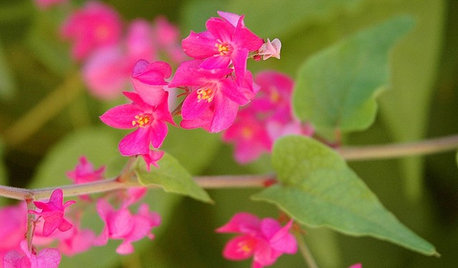Ignore soil/water pH and spray with iron?
gonebananas_gw
11 years ago
Related Stories

GARDENING GUIDESHow to Stop Worrying and Start Loving Clay Soil
Clay has many more benefits than you might imagine
Full Story
GARDENING GUIDESGrow a Beautiful Garden in Alkaline Soil
Got alkaline soil? Learn how to manage it and the many beautiful plants that will thrive in this ‘sweet’ soil
Full Story
MATERIALSInsulation Basics: What to Know About Spray Foam
Learn what exactly spray foam is, the pros and cons of using it and why you shouldn’t mess around with installation
Full Story
LIFEThe Top 5 Ways to Save Water at Home
Get on the fast track to preserving a valuable resource and saving money too with these smart, effective strategies
Full Story
SAVING WATERXeriscape Gardens: How to Get a Beautiful Landscape With Less Water
Conserve water and make gardening much easier with the xeriscape approach’s 7 principles
Full Story
ARCHITECTUREWant to Live by the Water? What You Need to Know
Waterside homes can have amazing charm, but you'll have to weather design restrictions, codes and surveys
Full Story
GREAT HOME PROJECTSHow to Switch to a Tankless Water Heater
New project for a new year: Swap your conventional heater for an energy-saving model — and don’t be fooled by misinformation
Full Story
GARDENING GUIDESGreat Design Plant: Antigonon Leptopus in California and Desert Gardens
Dry climates can enjoy sprays of delicate pink flowers and heart-shaped leaves on this drought-tolerant, summer-flowering vine
Full Story
HOUSEPLANTSHow to Force Amaryllis Bulbs Indoors
Enjoy vibrant red blossoms even as gardens turn snowy white, by teaching this hardy repeat performer to ignore the calendar
Full Story
GREEN BUILDINGHouzz Tour: Going Completely Off the Grid in Nova Scotia
Powered by sunshine and built with salvaged materials, this Canadian home is an experiment for green building practices
Full StoryMore Discussions








johnmerr
alan haigh
Related Professionals
Wrentham Landscape Architects & Landscape Designers · Ballenger Creek Landscape Architects & Landscape Designers · Leawood Landscape Architects & Landscape Designers · Prairie Ridge Landscape Architects & Landscape Designers · Towson Landscape Architects & Landscape Designers · Bridgeview Landscape Contractors · El Reno Landscape Contractors · El Segundo Landscape Contractors · Farmington Landscape Contractors · Fishers Landscape Contractors · Fountain Valley Landscape Contractors · Huntley Landscape Contractors · Lake Saint Louis Landscape Contractors · Mequon Landscape Contractors · Richmond Landscape Contractorsbamboo_rabbit
Ernie
alan haigh
bamboo_rabbit
gonebananas_gwOriginal Author
Michael